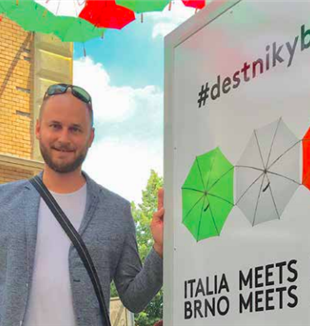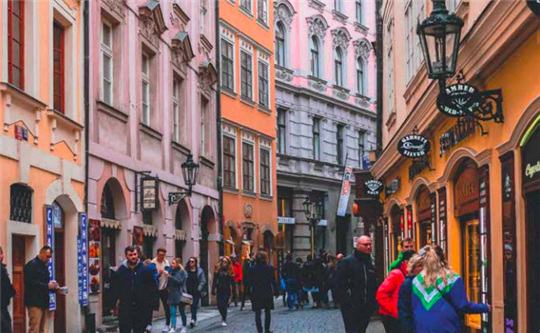
Everything Begins with an Encounter
After the fall of the Berlin Wall he was moved by a desire to be engaged in politics as a Christian. Today David Macek has left politics behind for a new way of building society with efforts ranging from the Brno Meeting to the Drfg Foundation.“I see myself at school again, 13 years old, with a new world opening before my eyes.” It was 1989. David Macek was living in Brno, the capital of the Czech region of Moravia. At the time, it was Czechoslovakia, not yet the Czech Republic and Slovakia, and the country had been under Communist rule since 1946. The wind that was blowing through an Eastern Europe controlled by the Soviets which would lead to the fall of the Berlin Wall had reached Prague with the “Velvet Revolution,” marking the end of the regime and bringing on the presidency of Václav Havel, the first free elections in June, 1990, and, in 1992, independence for the two countries. Today Macek, married and the father of five, works for the Czech philanthropic foundation Drfg, after years spent in politics.
In order to see what remains today of the European dream, one can start here, with his story, with the discovery of a new world of citizenship and freedom that invaded this part of Europe in the early 1990s, a world that gave David the opportunity for many encounters and the opportunity to form friendships that led to a variety of initiatives. One such initiative was the Brno Meeting that occurred in 2016, a two-week event chock full of cultural events in the Czech city. Another was the “March of Reconciliation” to heal the open wound between Czech– and German-speaking Czechs that was created at the end of the Second World War when the latter were forced to leave the country notwithstanding a long history of coexistence.
“My love for politics and engagement in society began when I was 17 years old through diocesan youth groups that introduced me to the social doctrine of the Church,” recounts Macek. The question he had at the time was whether faith could contribute to a new adventure of freedom. David and his friends went around to parishes to make the social encyclicals known. Then he began his first political activity in Brno and started studying social sciences at the university. Upon his graduation, a senator offered him a job as his assistant, but Macek also received an invitation from the Pontifical Lateran University to study in Rome.
“The senator told me he would wait for my return. That was 2003. The next year, the Czech Republic became part of the European Union.” David ran as a candidate for the European parliament but was not elected. He became a member of the Moravian Regional Council, and in 2006 began serving as the vice president of the Christian Democratic Party.
“I was a 30-year-old politician with little experience. I needed help.” In Rome, he met people engaged in Italian politics and also CL. “I found the group again in Prague with the Missionaries of Saint Charles Borromeo. Once I asked them if a special spirituality was needed to do politics as a Christian. They smiled and said ‘We’re friends. We meet, talk, and pray together.’ It took me years to understand that Christianity isn’t something abstract” and that there is no special way. “You live your encounter with Jesus where you encountered Him. For this reason, I left the party in 2015,” which seemed paradoxical. “In those years I began encountering realities that played a much more constructive role in society than politics reduced to the intrigues of party politics, including the Meeting of Rimini, the Cometa Association, which offers a home and formation for kids, and the Company of Works.”
In this period, the issues of the day throughout Europe were migrants, terrorism, and its relationship with Islam. Macek said, “I wasn’t satisfied with just discussing these things: I wanted to meet people.” After the terrorist attacks in Paris in January of 2015, “The muslim community of Brno took the risk of denouncing these acts. I went to meet and pray with them at the mosque. But people in the party criticized me, and did so again when I went with some friends to the station to welcome the first Syrian refugees. None of my political colleagues came. Instead, they were all wrapped up in the idea of ‘we Christians defending the country against these Muslims.’” Was what he was doing political engagement? Macek put it this way: “It was pre-politics: going to see, so as not to reason in a populist or ideological way.”
Then, at the CL vacation in 2015, he heard the line, “Everything begins with an encounter.” Soon after “with some friends of my city I began working on what would be the first Brno Meeting. But it was my encounter with Zygmunt Bauman in Como, during a visit to the Cometa center, that made me decide to leave my career in politics.” It was a simple conversation, but Macek could not get it out of his head. “I chose to change roads in order to be able to explore such encounters more deeply.”
He spoke with some friends and renewed some previous relationships. “One of the results of this led to the creation of the foundation where I work, which not only supports charitable works but tries to create spaces of encounter and dialogue in Europe. I am certain that this is a response to the problems of my country.” He says that he is happy when he arranges for friends and acquaintances to visit Italy with him so he can show them what he has seen. “These are politicians, managers, and intellectuals. This year there will be a Czech presence at the Meeting of Rimini with Pavel Fischer, a senator who ran for the Czech presidency, and other figures.” There will be an exhibit on Havel, which will later be shown in the Italian parliament, the Czech parliament, the European parliament, and in Geneva, before coming to the Brno Meeting in 2020.
“Havel’s words from forty years ago about ‘living in the truth,’ answer the question of how one can be a politically active citizen even when it seems that he alone can do nothing,” adds Macek. This does not mean that one cannot act constructively in a party or regional council or in parliament. “On the contrary. This is my story. As long as I found space for action, I was there. But when I encountered something greater, which politics in the strict sense was unable to produce in that moment, I chose to make my contribution to the common good in another way. As the Church’s doctrine says, politics can be renewed starting from civil society, where the person is educated and can truly know. The politics of political parties is good when it valorizes these spaces. This is why it is important, independently of my own journey.”
Macek showed Pavel Fischer what he had seen. “After the presidential elections, I went to him and told him about the interesting way of doing politics I had seen in Italy, about subsidiarity and how it is applied in many of the works I had seen. We organized a trip to Milan and its environs, meeting people and visiting the site of various works. Upon our return, Fischer, a great scholar of social doctrine, told me he had never seen anything of the kind. “‘They truly live and move because of an encounter they have had,’ he said. For me, this can change politics.”